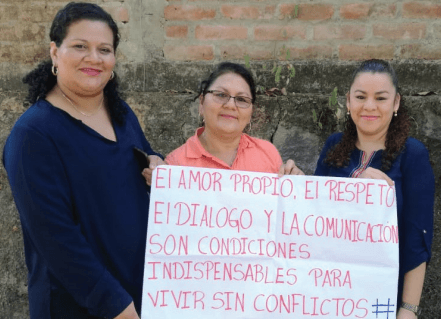
In the midst of a global pandemic and despite all the challenges that online learning can present, 21 women from our ESPERA program committed to a year-long online training program that focuses on personal leadership development and organizational effectiveness.
The 12-month course was designed with the understanding that, by helping to further develop the leadership skills of women who are already considered leaders within ESPERA, their organizations can also benefit by functioning more efficiently and effectively. “Our goal is to train leaders … with the tools that contribute to individual and collective development, and have a positive impact on the achievement of institutional objectives,” said Abigail Martínez López, a Salvadoran psychologist who designed the program for ESPERA and is co-facilitating the training with two colleagues based in Spain. Tere, a small business owner and a member of ESPERA partner Red de Morelenses por una Economía Solidaria in Morelos, Mexico, jumped at the opportunity to participate in the training. “ [The course] will help me to more deeply comprehend a series of themes that are important for the development of women.”
Women from 5 different countries where ESPERA has a presence are participating in the course. Tere values this diversity. “Connecting with other people and being able to hear about the injustices we all face as women, but in different ways, helps me understand another way of thinking and feeling,” she said. “This component of participating in conversations with women from diverse backgrounds enriches the course.”
The 4 Training Modules
The training is facilitated on Google Classroom, where videos, readings, and homework are posted once-a-week. Each month features a specific theme and participants have 4 weeks to complete all of the activities, including practical application of the concepts. At the end of the month women complete an assessment, which allows the facilitators and ESPERA team to understand how much information and skills participants are acquiring in the training.
• Module #1: Conflict resolution, emotional intelligence in the workplace, and teamwork.
• Module #2: Interpersonal communication skills, promotion of healthy organizational environments, and the adaptation of situational leadership skills.
• Module #3: Interpersonal relationships through teamwork, personal leadership skills, and sustainable administrative practices.
• Module #4: Application of knowledge and skills obtained during the first 3 modules to help organizations implement strategies for workplace success.
Putting Knowledge into Practice
A key component of the curriculum includes hands-on practical experiences. “It’s not about memorizing things,” Gilda Larios, Mary’s Pence ESPERA Team Lead, explained. The women will learn through practice. They will learn strategies to help make changes within themselves as leaders, and with regard to their work.
Of the 21 women participating in the program, many have leadership roles within ESPERA partner organizations. As part of their course assignments, participants discuss the coursework with their colleagues. A recent assignment requested that participants discuss topics related to healthy communication with their co-workers and develop a hashtag summarizing their group’s commitment to peaceful and respectful dialogue. Although Dora Alicia, women’s group coordinator for ESPERA partner Asociación de Mujeres Emprendedoras por la Justica de San Rafael Cedros in San Rafael Cedros, El Salvador, is already familiar with many of the concepts being taught, she is excited that the modules are delving deeper into the skill development — giving her a new appreciation to see things from a different, closer point of view.
For example, Dora Alicia has learned more about the way she thinks about violence and conflict resolution within the workplace, as well as within her personal relationships. She’s shared some of the course materials with her partner who has also benefited from the audio lectures about stress management. “If we look deeper for the cause of the problem and understand our role in the conflict, we will have a different way of solving it.”
Train the Trainers Model
Abigail is the primary coordinator and facilitator of the 12-month training. In addition to her degree in psychology, Abigail is a trained specialist in emotional ecology — or emotional well-being — which helps women foment personal development skills and institutional strengthening. In 2020, Abigail organized and facilitated ESPERA’s Co-Escucha Program, which provided a series of informational video lectures and guided meditations to help women cope with the pandemic by encouraging them to discuss their feelings with one another.
In addition to providing ESPERA women with the knowledge, resources, and skills to contribute to the organizational effectiveness of their ESPERA groups and local women’s organizations, the expectation is that ESPERA staff Gilda, Eva Martínez, and Brenda Valladares, will learn the content and develop the skills necessary to provide the same training for ESPERA participants in the future.“ It’s a train the trainer model,” Gilda explained. “The idea is that, once this training is over, those who participated in the program will assume greater leadership roles within their organizations.”
Participants are already sharing their skills. “Part of me becoming a better leader means sharing the tools I’ve learned with other members of the [ESPERA] group,” said Tere, who recently gave a presentation to her ESPERA group about conflict resolution during an April meeting and plans to share more information at their May gathering. “We don’t want the lessons to just stay with us; we want to replicate it.”
